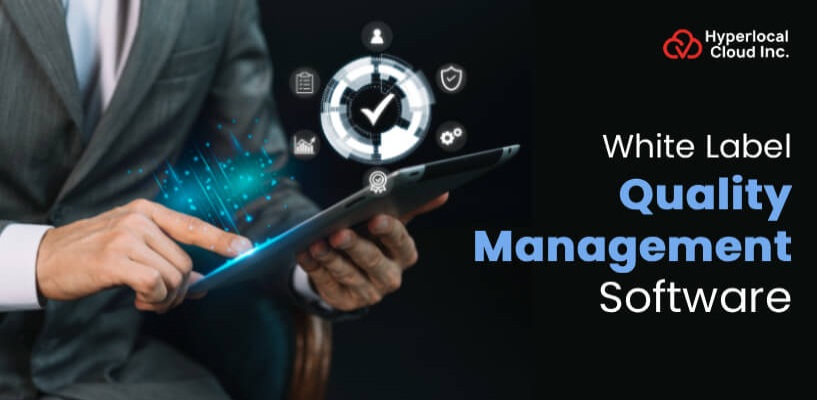White Label Quality Management Software

Nowadays, the quality of business environments is more than just a buzzword; it is a critical factor. Organizations throughout sectors ought to deliver services and products that meet customer expectations, comply with rules, and perform effectively. This is the scenario where the quality management software evolves so much and becomes in demand among businesses.
As per the reports, it is seen that the overall growth of the QMS is marked at around 11.14 billion in 2024 and is expected to reach around 20.06 billion by 2030. That’s the reason businesses or industries are now moving toward quality management software to automate the workflow of their manufacturing, healthcare, and food industries.
What is Quality Management Software?
A quality management software program is a virtual device or suite of tools designed to help businesses manage and improve their quality processes. Rather than relying entirely on manual tests, spreadsheets, or paper-based systems, QMS offers an established and often automated manner to seize, reveal, manage, and improve data across diverse features.
Typical features of a quality management software include:
- Document control
- Audit management
- Corrective & Preventive Action (CAPA)
- Supplier quality management
- Risk assessment and management
- Training and competency management
- Reporting and analytics
Book a demo and see why businesses trust our white label QMS solution
Why Investing in a White Label Quality Management Software Is Beneficial?
Businesses eager to start their journey affordably with a robust mobile app solution can invest in white-label quality management software. The software solution offers numerous benefits that ultimately deliver superior results for your business. Have a look at the top-most benefits of investing in white label solutions as mentioned below.
1. Rapid Time to Market
Building a full-featured software program from the ground up is a resource-intensive process, encompassing planning, design, development, testing, deployment, and support. By leveraging a white label solution, organizations can avoid tons of that overhead.
2. Cost and Resource Savings
Developing and keeping software requires funding for development teams, infrastructure, ongoing renovation, malicious program fixes, improvements, and testing. The white label model transfers lots of that burden to the software dealer.
3. Branding and Market Differentiation
When you provide the best management software under your own logo, you enhance your emblem’s credibility and marketplace perception. You can present a comprehensive, branded presentation in preference to being perceived entirely as a consultancy or service company.
4. Scalability and Flexibility
A nicely-designed white-label QMS is constructed for scale, supporting a couple of clients, tenants, and configurable modules. In that manner, as your customer base grows, you can add more users, more modules, even new vertical industries, without having to rebuild your platform whenever.
5. Lower Risk
Launching a software product usually includes risk: will the solution meet market needs, will it be stable, will improvements run into delays or price range overruns? Because white label solutions are already advanced, tested, and in use, you mitigate many of the risks.
6. Access to Ongoing Features/Updates
With a white-label model, the software program dealer commonly handles improvements, new functions, upkeep, and protection patches. As a reseller, you benefit from a constantly evolving product while not having to invest closely in development.
7. Additional Revenue Streams
If you are a consulting company, a provider, a supplier, an industry exchange body, or a certification frame, providing a white-label QMS provides an extra sales channel. You can charge subscription fees, licensing prices, implementation and schooling offerings, and differentiate your packages.
8. Faster Client Onboarding and Client Value
Because the underlying software program is established and geared up, you can shorten the onboarding time for customers. For your customers, this means a quicker price: they can begin using the QMS tool, automate their procedures, and get dashboards and audit workflows up and running quickly.
The Comprehensive Core Features of Quality Management Software
QMS plays a vital role in enabling groups to keep exceptional standards of their products, offerings, and approaches. It is designed to automate and simplify fine-related obligations, making it easier for groups to display, manage, and improve their operations.
1. Document Control
Document management guarantees that each document associated with quality, like procedures, painting instructions, manuals, and rules, is well organized and easily accessible. It prevents confusion resulting from previous or missing files.
2. Audit Management
Audits are an essential part of any best practice. They help identify regions that need improvement. A QMS streamlines the audit system by enabling corporations to plot, schedule, and document audits in a single system.
3. Corrective and Preventive Action (CAPA)
CAPA control is another essential feature. It focuses on identifying the basic reasons for issues and making sure that they are addressed completely. The software program automates the entire process, from recording a hassle to verifying that the answer is powerful, helping groups prevent similar troubles from occurring.
4. Risk Management
Every organisation faces dangers that would affect product quality or purchaser pride. With a QMS, risks can be recognized, assessed, and prioritized. The software allows broadening plans to reduce or mitigate those risks.
5. Training Management
Training management guarantees that personnel have the vital skills and understanding to perform their tasks successfully. A QMS tracks employee schooling, certifications, and talents. It can automatically remind managers when a worker’s certification is about to expire or when new training is required.
6. Supplier Quality Management
Suppliers play a vital role in retaining the universal product’s first-rate quality. An excellent QMS includes dealer evaluation and tracking gear to ensure that raw substances and components meet the best standards. Businesses can assess supplier performance, manipulate provider audits, and receive satisfactory feedback in real-time.
7. Non-Conformance Management
Non-conformance happens when a product or system fails to satisfy a requirement. A QMS makes it easy to document, track, and resolve these problems. It additionally facilitates picking out ordinary problems and increasing preventive measures.
8. Reporting and Analytics
A comprehensive QMS offers distinct dashboards and reports that give insights into overall performance, compliance, and first-class trends. These reviews assist decision-makers in understanding where enhancements are needed and assessing the effectiveness of fine tasks.
Leverage AI-Driven Technologies to Reshape the QMS Solution
Artificial intelligence is revolutionizing the way organizations approach great control. When included with a QMS, AI brings automation, prediction, and intelligence to the device.
1. Predictive Quality Analysis
AI can analyze historical facts to predict destiny’s pleasant issues. For instance, it is able to hit upon patterns that frequently cause product defects or screw ups. This allows companies to take preventive measures earlier than a problem takes place.
2. Automated Data Collection
Instead of relying on guide information access, AI-powered QMS can routinely gather facts from machines, sensors, and other digital resources. This reduces human error and ensures more accurate and excellent records.
3. Smart Auditing
AI enables automating the audit system by identifying regions with better risks or common problems. It can also advise on audit questions primarily based on preceding findings, making audits more focused and targeted.
4. Natural Language Processing
NLP permits the machine to apprehend and examine written text. This is beneficial for scanning files, emails, and reports to identify first-class-associated phrases or capacity problems. It can also help in routinely categorizing customer comments.
5. Real-Time Quality Monitoring
With AI, a QMS can reveal manufacturing statistics in real time and immediately flag any abnormalities. This allows for limited waste, improves production pace, and ensures certain steady products at their first rate.
6. AI-Powered Decision Support
AI equipment can assist managers by providing pointers based on statistical insights. For example, if the system detects that a selected provider is inflicting common defects, it’d recommend switching providers.
Get a personalized quote for your white label QMS solution
The Specific Steps to Develop A Quality Management Software
We are an experienced custom software development company that follows several essential and advanced steps to build a reliable QMS solution. Here are the steps that businesses can follow for development purposes.
1. Define The Purpose
Start by figuring out what you want your QMS to achieve. Do you need better compliance tracking? Are you seeking to lessen defects or improve supplier collaboration? Clear dreams will make each improvement decision.
2. Conduct Market and User Research
Understand the demanding situations users face in managing pleasant. Talk to managers, auditors, and manufacturing staff. This will assist you in discovering important capabilities and value wishes.
3. Design the System Architecture
The gadget architecture defines how distinctive modules, such as file control, CAPA, and audits, will work together. It’s crucial to lay out a scalable and stable structure that can handle future booms.
4. Develop the Core Modules
The development process is the core part that takes place in the form of two different methods. You can develop the software from scratch or by utilizing a white label solution, which also makes the development easier and cost-effective. Depending on your choice, the cost will be determined.
5. Test Thoroughly
Testing is crucial to ensure the software program works correctly. Conduct unit checking, integration checking, and person popularity checking. It’s critical to involve real users throughout the testing to get realistic comments.
6. Deployment and Maintenance
After successfully trying out, deploy the software in a live environment. Continue monitoring its performance and release updates or computer virus fixes regularly.
The Tech Stack Used to Build Quality Management Software
Several tech stacks are used by our experienced developers, which will be helpful to make the platform secure and robust. Just have a look at the table below.
| Category | Tech Stack |
| Front-End Technologies | React.js, Angular, or Vue.js |
| Back-End Technologies | Node.js, Python (Django/Flask), Java (Spring Boot), or .NET |
| Database | MySQL, PostgreSQL, and MongoDB |
| AI and Machine Learning | ERP, CRM, or MES. RESTful APIs or GraphQL |
| Security Frameworks | OAuth 2.0, JWT tokens, and SSL encryption |
Who Can Utilize Quality Management Software?
Quality management software may be used by almost any corporation that values quality and compliance. Here are a few sectors and roles that gain the maximum:
1. Manufacturing Companies
Manufacturers depend upon QMS to make sure that each product meets requirements before being delivered to customers. It enables control of production pleasantness, manages defects, and follows industry rules.
2. Pharmaceutical and Healthcare Organizations
In those industries, excellence is vital for ensuring patient safety and retaining regulatory compliance. QMS guarantees that every process adheres to the suggestions set by the FDA or ISO requirements.
3. Food and Beverage Industry
A QMS helps maintain hygiene, protection, and consistency in meal products. It additionally allows traceability in the event of remembering.
4. Automotive Industry
Automotive businesses use QMS to expose dealer excellence, manage recollections, and ensure compliance with requirements like IATF 16949.
5. Construction and Engineering
In construction and engineering, a QMS ensures that materials, designs, and safety techniques meet the required standards. It additionally helps file each degree for responsibility.
6. IT and Software Companies
Even software program companies use QMS to ensure outstanding deliverables, manage documentation, and maintain client pride.
Let’s build your branded quality platform
Proven Strategies to Generate Revenue from Quality Management Software
Businesses that are planning to develop a QMS solution can leverage the monetizing strategies discussed in the table below.
| Key Monetizing Strategies | Description |
| Subscription-Based Model | This is the most commonplace approach. Offer the software as a month-to-month or annual subscription. Different plans may be primarily based on consumer memory, features, or garage potential. |
| Freemium Model | Provide a simple version of your QMS at no cost and offer superior capabilities, along with AI analytics, automation, or integrations, for a fee. This enables them to attract more customers initially. |
| Customization Services | Offer paid customization for companies that need particular workflows or reviews. Many groups are inclined to pay more for tailored features. |
| Integration Packages | Charge for integrating your QMS with different enterprise systems, inclusive of ERP or CRM. Seamless integration is especially precious to customers. |
| Training and Support | Provide top-class training and 24/7 customer support as an upload-on carrier. Good assist builds are accepted as true and generate regular sales. |
| Licensing Model | Offer one-time licensing for firms that choose to host the QMS on their own servers. You can nevertheless charge for updates or maintenance. |
| White Label Solutions | Sell white-label versions of your QMS to consultants or resellers who want to brand it as their own product. |
Wrapping Up!
A QMS program is a necessity for corporations that need to maintain high-quality standards, reduce errors, and enhance client satisfaction. From record management and audit control to AI-powered predictive analysis, QMS solutions convey structure and intelligence to enterprise operations. At Hyperlocal Cloud, we develop quality management software affordably at $6,000. To empower your business with technological advancements, partner with us. Sounds good? Then reach out to our tech experts to know more details.





